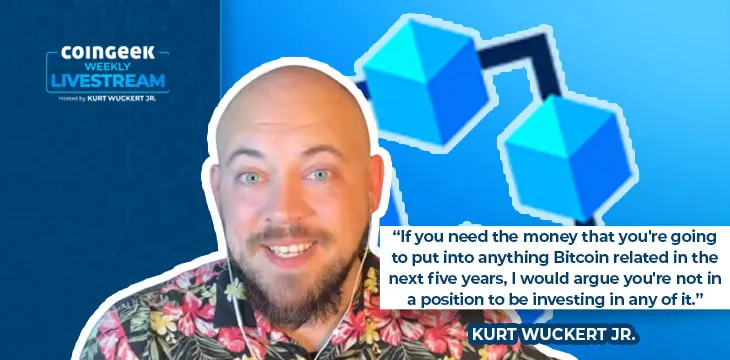|
Getting your Trinity Audio player ready...
|
On episode 13 of the latest CoinGeek Weekly Livestream season, host Kurt Wuckert Jr. answered viewers’ questions about all things BSV. This episode was packed with useful knowledge about how the original Bitcoin works and what it can do.
Can Wuckert interview Vel Freedman?
Wuckert begins by saying he met Freedman during the Kleiman v Wright trial and got to know him a little. He found the conversations cordial and polite.
As a result of this, he would not be opposed to having Freedman on the show. He wouldn’t talk to him about the Kleiman case, but he’d be happy to host him generally, even if they disagree strongly on the facts.
What are some examples of Unwriter’s work in use today?
Wuckert takes the first viewer’s question, thanking them for an opportunity to discuss this. He says quite a bit of Unwriter’s stuff is still in use today, although not so much infrastructure.
Wuckert notes that Unwriter both developed software and defined various protocols. For example, he explained the B://Protocol, hoping others would simply adopt it. He defined logic for many other things, too. While some of his software is still in use, the protocols are more so.
Wuckert notes that while the memory of Unwriter is still strong, and some of his protocols are still used, things are increasingly moving away from his software.
Describe the Lightning Network in one sentence. Use metaphors if needed.
“Lock your bitcoins in this wallet, issue them on this other network, and trade them across an abacus to drug dealers and settle them when you want or maybe never,” Wuckert says, giving a powerful description of the shambles that is the Lightning Network.
What’s going on with HandCash and Rock Wallet?
Wuckert isn’t aware of any breaking news with regards to either of the two, but Handcash recently announced they would support 1Sat Ordinals protocol. This protocol has been taken up exceptionally quickly. Wuckert has expressed hope before that it might ‘unite the clans,’ so to speak. So far, it’s looking like that might be the case.
Wuckert says he’s trying to set up an interview with Rockwallet to learn more about their plans, roadmap, and more. He says he’ll keep everyone posted about that.
Will either ever integrate card support for point of sale? Wuckert says he wishes they would, and Handcash used to a while back. They deprecated it to redesign how their wallet works. He says someone could probably bootstrap it and build one using Handcash SDK documentation and tools.
What features are wallets missing today?
Wuckert says the word wallet needs to be clarified. Wallets are actually key management software for unlocking and assigning coins. People mistakenly think of it as coins in your wallet, he says. He adds that, for whatever reason, wallet developers have focused on doing either coins or tokens well or doing fiat well (Handcash), but nobody has done it totally right yet.
Wuckert reiterates that using open protocols is crucial, something he has said many times before. He adds that even if wallets want to focus on one thing, they need to make their wallets able to interact with others. Giving an example of what he’d like to see, he says that he’d like his business and personal Handcash wallets to be different colors to quickly and easily verify which he was using.
Overall, he’d like to see more people integrating and building on open standards. A lot of this has to start at the wallet level, he says.
Why is Elon advertising Doge on Twitter?
Wuckert starts by saying he’s not the biggest Musk fan. He isn’t anti-Musk, but he dislikes trolling on Twitter and pumping his bags. He says this undermines Musk’s credibility, and while some of it is fun, the pump-and-dump stuff is not.
Is he going to integrate Doge tipping? “We’ll see,” Wuckert says, reiterating that Musk’s cocky nature makes him do things like this, so it’s impossible to tell what he has in mind.
What does Ordinals mean for all other token protocols on BSV?
“We don’t really know,” Wuckert begins. He praises some of the other token protocols, saying STAS and RUN are both still really good at some things. He says BSV still lacks a fungible token protocol, at least as far as he’s aware.
Wuckert thinks Ordinals could be great for low-level NFTs (not just JPEGs). There are many use cases for these, but Ordinals probably won’t absorb everything.
Has Wuckert noticed any more interest in Ordinals due to transaction throughput limits on BTC? He’s unsure if many have made their way across yet, but he is noticing many more complaints in the BTC camp about these limits. The volume is also causing fees to rise.
Add to this that small block fanatics will likely look to get rid of Ordinals people at some point, and they’ll sooner or later be looking for somewhere to go.
What needs to come out of the Ordinals hype to make people realize BSV means business? Wuckert says he isn’t sure. Liquidity is an issue because many companies need or want to get dollars out, but where BSV could immediately shine is by processing mass volumes of transactions.
Why should individuals not get involved in BSV mining? Why is buying BSV over time beneficial?
“If you need the money that you’re going to put into anything Bitcoin related in the next five years, I would argue you’re not in a position to be investing in any of it,” Wuckert points out.
For this reason, he hopes individuals aren’t investing money they may immediately need. He’d like to see people utilizing legal structures like LLCs and doing business in the Bitcoin economy with a longer-term view. He lists many ways to get involved, including mining.
Wuckert reminds viewers he is not a financial advisor and they should always do their own research before investing in anything.
Are there any coins on the market that require renewable energy to be used for mining?
Wuckert isn’t aware of any that specifically require it, but he points out that there’s a huge incentive to move towards renewable energy, and miners are well aware of it. As a result, most Bitcoins are mined with renewable resources.
“More and more green equals more and more efficient, equals more and more profit,” Wuckert says.
Am I the only one seeing more BSV faces and fans?
“You are not the only one,” Wuckert notes enthusiastically. The meetups and conferences are growing interest in BSV, spreading fast in places like the Philippines.
When is the Florida Citadel Party?
Wuckert closes by saying they do them all the time. “Check out our meetup page,” he says. Viewers can also stay updated on the Bitcoin Florida Twitter page.
Watch: Blockchain mining & energy innovation

 09-18-2025
09-18-2025 





